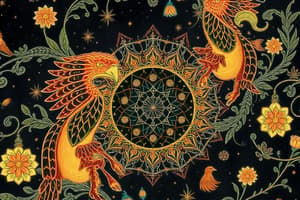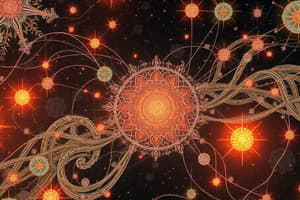Podcast
Questions and Answers
Magnets were first discovered by a shepherd named Marcus in Magnesia.
Magnets were first discovered by a shepherd named Marcus in Magnesia.
False (B)
Man-made magnets come in a singular shape and size.
Man-made magnets come in a singular shape and size.
False (B)
A ball rolling on the ground will continue to roll indefinitely if there is no friction.
A ball rolling on the ground will continue to roll indefinitely if there is no friction.
True (A)
Materials such as iron, nickel, cobalt and steel are considered non-magnetic materials.
Materials such as iron, nickel, cobalt and steel are considered non-magnetic materials.
Magnets around refrigerator doors are temporary electromagnets.
Magnets around refrigerator doors are temporary electromagnets.
Wood and paper are attracted to a magnet.
Wood and paper are attracted to a magnet.
Applying a force to an object can only change its speed and direction, but not its shape or size.
Applying a force to an object can only change its speed and direction, but not its shape or size.
Friction is a hindrance and doesn't help us in any way.
Friction is a hindrance and doesn't help us in any way.
The strongest force of a magnet is located at its center.
The strongest force of a magnet is located at its center.
Electromagnets function as magnets only when there is a flow of electricity.
Electromagnets function as magnets only when there is a flow of electricity.
Like poles of magnets attract each other.
Like poles of magnets attract each other.
A force is only a push applied to an object.
A force is only a push applied to an object.
Friction is a type of force that speeds up a moving object.
Friction is a type of force that speeds up a moving object.
Flashcards
What is a Magnet?
What is a Magnet?
A special type of rock that attracts certain metals like iron, nickel, and cobalt.
Natural Magnets
Natural Magnets
Magnets are natural materials, found in nature, like the lodestone (magnetite).
Man-made Magnets
Man-made Magnets
Man-made magnets, made of materials like iron or steel, can be shaped for different uses.
Poles of a Magnet
Poles of a Magnet
Signup and view all the flashcards
Unlike Poles Attract
Unlike Poles Attract
Signup and view all the flashcards
Like Poles Repel
Like Poles Repel
Signup and view all the flashcards
Magnetic Force
Magnetic Force
Signup and view all the flashcards
Magnetic Materials
Magnetic Materials
Signup and view all the flashcards
What is friction?
What is friction?
Signup and view all the flashcards
What are the effects of force?
What are the effects of force?
Signup and view all the flashcards
What are magnets and electromagnets?
What are magnets and electromagnets?
Signup and view all the flashcards
How is friction useful?
How is friction useful?
Signup and view all the flashcards
Where are magnets used?
Where are magnets used?
Signup and view all the flashcards
Study Notes
Magnets: Properties and Uses
- Magnets are naturally occurring materials or man-made objects, typically composed of iron or steel, that attract certain metals.
- Natural magnets are often called lodestones or magnetite.
- Man-made magnets can be various shapes (U-shaped, horseshoe, bar, rod, ring, button).
- Magnets attract specific materials (magnetic materials) – iron, nickel, cobalt, and steel.
- Nails and paperclips are examples of magnetic materials.
- Magnets do not attract non-magnetic materials such as gold, silver, aluminum, copper, wood, paper, plastic, glass, and clay.
Magnet Characteristics
- Magnets have two poles: a north (N) pole and a south (S) pole.
- The strongest magnetic force is concentrated at the poles.
- Like magnetic poles (N-N or S-S) repel each other.
- Unlike magnetic poles (N-S) attract each other.
- Steel pins are attracted to both ends of a magnet.
Magnetic Force
- A force is a push or pull on an object that interacts with another.
- Force can change an object's motion (speed and direction), start it moving, stop it, change its shape, cause an object at rest to move.
- Friction is a force. It slows down or stops moving objects.
Uses of Magnets
- Magnets are found in many common electrical devices (telephones, speakers, headphones).
- Electromagnets, temporary magnets activated by electric current, are found in computers, and video recorders.
- Refrigerators use a magnet to close the door tightly.
Studying That Suits You
Use AI to generate personalized quizzes and flashcards to suit your learning preferences.




